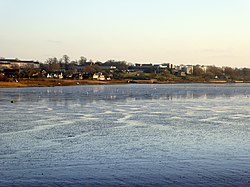| Commando Training Centre Royal Marines | |
|---|---|
| Lympstone, Devon, England | |
 Commando Training Centre Royal Marines, from across the River Exe | |
| Site information | |
| Type | Royal Marines Base |
| Owner | Ministry of Defence |
| Operator | |
| Controlled by | |
| Website | CTCRM Lympstone - Royal Navy |
| Location | |
| Coordinates | 50°39′50″N3°26′17″W / 50.663971°N 3.438024°W |
| Site history | |
| Built | 1940 |
| Built for | Admiralty |
| In use | 1940–present |
| Garrison information | |
| Current commander | Colonel Innes Catton |
| Garrison | Commando Training Centre |
| Occupants | Commando Wing Commando Training Wing Specialist Wing |
Commando Training Centre Royal Marines (CTCRM) is the principal military training centre for the Royal Marines. It is situated near the villages of Lympstone and Exton, between the city of Exeter, and the town of Exmouth in Devon, England.



